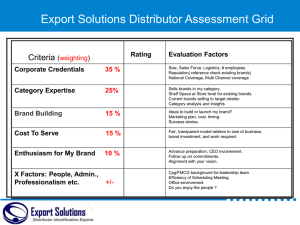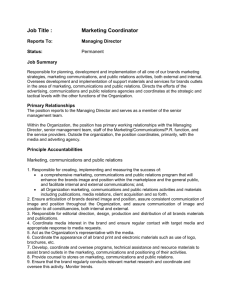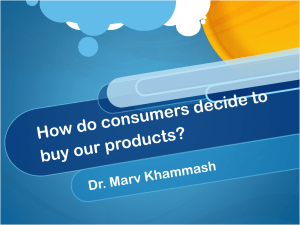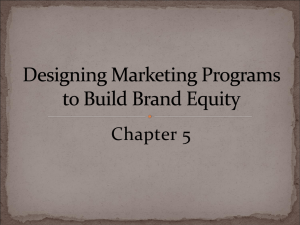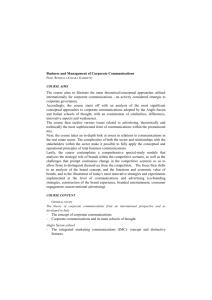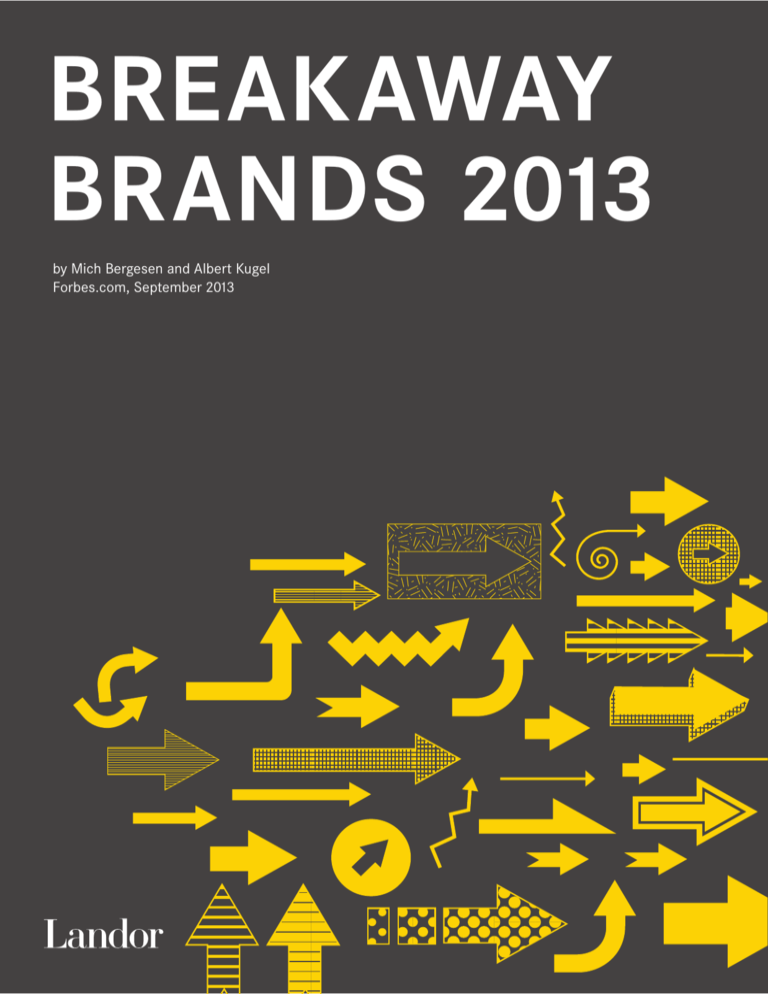
BREAKAWAY
BRANDS 2013
by Mich Bergesen and Albert Kugel
Forbes.com, September 2013
This PDF is designed to be printed
double-sided to help you conserve paper.
© 2013 Landor Associates.
All rights reserved.
Landor Associates is the world’s preeminent brand consulting firm, specializing in
creative strategy, design, innovation, and
naming. Landor is part of WPP, one of the
largest global communications services
companies. Visit us at landor.com.
Breakaway Brands 2013
This is not another story trumpeting the use of
social media to build brand communities. While
many have written about the need to reinvent
the marketing plan to succeed in today’s digital
environment, the Breakaway Brands® 2013 study
tells a different tale.
Landor’s annual Breakaway Brands study measures
sustained growth in brand strength over a three-year
period using BrandAsset® Valuator (BAV) data (see
Methodology sidebar). This year our study reveals
that consumer packaged goods (CPG) brands
predominantly led the charge with the greatest gains
in relevant differentiation from 2009 to 2012. Each
Breakaway Brand also showed strong business
performance, whether in market share, profitability,
or stock price growth.
Unlike last year’s list, which was dominated by
newer tech brands such as Facebook and Skype,
this year’s Breakaways are mostly venerable
household names, ranging from Dawn to Dixie.
They achieved standout performance by excelling
in familiar strategies that have powered winning
brands for decades. That is not to say they’re
ignoring twenty-first-century tactics, like digital
and social, to help bring those strategies to life.
All of the brands on our list have comprehensively
embraced technology; the print and TV-heavy
media plans of yesterday now include well-curated
Facebook pages and engaging Twitter campaigns
as integral elements. But the drivers of this year’s
Breakaway Brands’ success are found in the tangible
ways customers experience their products and the
resulting brand loyalty this builds. The fact that digital
has simply become another tool in the marketer’s
toolbox reminds us of the power of fundamental
marketing strategies that have delivered sustained
results for years.
Mich Bergesen is global director of
financial sector branding, and Albert Kugel
is client manager. Both are based in the
New York office of Landor Associates.
This article was first published as “Quilted
Northern, other household names top list
of 2013 Breakaway Brands” on
Forbes.com (16 September 2012).
forbes.com
Take Quilted Northern. It may not be the brand one
would guess would top this year’s list, but according
to our BAV data, its differentiation scores jumped
over 1,000 percent between 2009 and 2012. The reason
can be traced back to 2008, when the brand launched
its three-ply Ultra Plush toilet paper in response to
market research that found that affluent women over
45 were willing to pay more for cleanliness.1 Quilted
Northern has embraced this new psychographic with
the usual mediums—TV and print—but it has also
Landor Associates 1
Breakaway Brands 2013
brand
growth in brand
strength, 2009–2012
Quilted Northern
91%
Jockey
78%
José Olé
70%
Kindle
59%
Dixie
58%
Febreze Sport
55%
Ford Sync
54%
Dawn
46%
Keurig
42%
Amazon.com
35%
Windows 7
38%
Thomas’ English Muffins
35%
iPhone
32%
Lego
29%
Reynolds Wrap
30%
Methodology Landor studied approximately 3,500 brands in Young & Rubicam
Group’s database, identifying those brands
that exhibited the greatest increases in
brand strength from 2009 to 2012. Growth
in brand strength indicates how much the
brand’s raw strength score has risen over
the past three years, expressed in percents.
2 Mich Bergesen and Albert Kugel
Watch List
brand
capitalized on mom bloggers and social media
with “Bathroom Confidential House Parties” that
invite women to broach the taboo topic of toilet
paper in homes across the country. In the first
year alone, the new, plusher product earned
$135 million in sales.2
Then there’s Jockey, which has successfully evolved
its brand while staying true to its roots through
a combination of product innovation and a wellexecuted marketing plan. It continued with steady
product development, introducing Staycool
technology and the antimicrobial Jockey Sport line.
To go along with these innovations, Jockey secured
new celebrity endorsements to appeal to a younger,
family-friendly audience: football star Tim Tebow
for the men’s line and celebrity stylist Rachel Zoe
for the women’s line. Complementing Jockey’s
traditional media spending are plenty of fun online
activations, like Rachel Zoe’s “Major Must Haves”
from the Jockey Pinterest page. To target men, this
year Jockey Sport made a big push in traditional and
new ways. Macho ads appeal to guys while a Twitter
campaign encourages users to hashtag their
workout updates with #everydayathlete. It’s quite
growth in brand
strength, 2009–2012
clear the moves are paying off. Jockey outpaced
the underwear category by over 7 percent in terms
of sales growth in 2011 (see Chart 1).
Tough on grease, gentle on hands has long been
Dawn’s brand promise, but in the face of increased
competition in the dish soap category, it has
cleverly evolved its pledge to consumers. During
the aftermath of the 2010 Gulf of Mexico oil spill,
and thanks to a generous donation from parent
company Procter & Gamble, Dawn soap was used
to clean affected animals. This helped elevate
the brand in the mind of the consumer and stand
out in the dish soap aisle. Together with small
product extensions, like partnering with Olay on
a hand renewal soap, these initiatives led Dawn
sales to outpace the category average in sales
growth by over 5 percent between 2007 and 2012.3
This year, Dawn launched a branded content push
on YouTube that is already a hit with consumers:
a video series exploring how Dawn is used in oil
cleanup efforts. Plenty of cute animals and Rob
Lowe’s narration made the series go viral.
above Febreze launched its Breathe Happy campaign, which
positioned the product’s primary benefit as a reward for
clearing a room of unpleasant odors and included events
such as yoga in Times Square.
left In the past three years, Lego’s product extensions,
licensing deals, and new media activations have embraced
its commitment to being a medium for creativity.
Below Dawn evolved its brand promise, Tough on grease,
gentle on hands, by helping clean animals affected by the
2010 Gulf of Mexico oil spill and creating small product
extensions, like partnering with Olay on a hand renewal soap.
Landor Associates 3
CHART 1
Internet retail growth in the
United States by total retail sales
12
45
10
40
8
35
Percentage growth
Percentage growth
Jockey’s sales revenue growth
compared to underwear category
CHART 2
6
4
2
0
-2
-4
-6
30
25
20
15
10
5
2008
Jockey
2009
2010
2011
Underwear category
chart 1 Euromonitor’s 2013 data shows
that Jockey consistently performed better
than the underwear category as a whole
between 2009 and 2012.4
chart 2 Amazon’s growth is over twice
that of the average e-retailer according
to Euromonitor data from 2013.5
2012
0
2009–10
Amazon
Amazon is arguably the biggest success of this
year’s Breakaway Brands. Together with its Kindle
subbrand, Amazon exemplifies how to use
technology to create tangible customer experiences and convenient product delivery. This is the
third year in a row that Amazon has made the list,
and the retailer’s results are certainly attributable
in part to continued refinement of the online
experience. Its vastly expanded range of purchase
platforms—from the tablet and mobile to the
connected TV or PlayStation—also adds to the
company’s success. This is an example of classic
brand-and-channel-extension strategy.
The Amazon Prime membership program delivers
highly relevant and valuable perks to repeat
customers, deepening loyalty and brand attachment across multiple categories. For example, in
addition to two-day shipping, Prime gives members
access to a library of digital media (like ebooks and
TV shows) that can be borrowed or streamed. It’s
no surprise that Amazon consistently grows at least
two times faster than the e-commerce category
overall (see Chart 2). Plus, Amazon is just getting
started—its often-overlooked web services
business is expected to double its revenue in 2013.
And at any given time, one-third of web users are
on websites or apps powered by Amazon. With an
estimated 500,000 servers, Amazon Cloud is the
largest cloud-based computer network on the
planet.6 Up next for the brand is Amazon Fresh,
a grocery delivery service that, if it can find
success where others have failed, will be yet
another winner for the retailer.
4 Mich Bergesen and Albert Kugel
2010–11
2011–12
Internet retail category
One of Amazon’s smart extensions has become
a Breakaway Brand in its own right: the Kindle.
Over just the past five years, Kindle e-readers
have quickly become the most popular family of
devices used by ebook buyers, capturing 55 percent
of all sales in 2012 through either the e-ink or tablet
versions. And the brand is not simply seen as an
e-reader. Since launching the Kindle Fire in late
2011, it has taken 20 percent of the tablet market.7
In the future, Kindle will be rolling out its e-readers
into China, which is expected to be its biggest
market yet.
Shifting back to CPGs, Febreze made our list for
showing that its brand can successfully extend to
new products and categories. It not only continues
to develop new product extensions, like Febreze
Sport and Febreze Sleep Serenity, but it also has
a strong ingredient branding strategy, allowing it to
attract new fans in other aisles of the supermarket.
Both Tide and Mr. Clean added Febreze scentfreshening ingredients to their product lines.
Meanwhile at over 1.5 million “likes,” the number
of fans on Febreze’s Facebook page rivals the
population of a small country. Last but not least,
Febreze launched its Breathe Happy campaign,
which positioned the product’s primary benefit
as a reward for clearing a room of unpleasant odors.
The campaign—and new products—pushed
Febreze sales over the $1 billion mark in 2012.8
Who would expect Dixie to be a Breakaway Brand?
This brand, previously known primarily for its paper
cups, made big strides in differentiation in 2009
after launching a super strong line of disposable
products called Dixie Ultra. The new line claims to
be 10 times stronger than the category average,
and it backs up its promise with a seal of approval
from Good Housekeeping. Dixie is no longer just
a brand of regular paper cups and plates, and its
BAV differentiation scores reflect that by jumping
over 200 percent in 2011 alone.
In the past three years, Lego’s product extensions,
licensing deals, and new media activations have
embraced the company’s commitment to being
a medium for creativity. The world of Lego has
expanded to include some of the biggest entertainment franchises. Today, kids can use their Legos
to reenact their favorite scenes from Star Wars,
Superman, and Marvel’s The Avengers.
Since launching in 2000, José Olé has ventured
to dominate the frozen Mexican food section
by insisting on high standards for flavor and
quality. The brand has slowly but surely added
product extensions, and today it offers customers
a menu rivaling any Mexican restaurant’s, right
in the freezer aisle. Once just a burritos and
taquitos line, José Olé now also makes chimichangas, tacos, empanadas, and stuffed nachos.
According to Grocery Headquarters, the José Olé
brand has driven 60 percent of the growth in the
U.S. frozen Mexican food category between its
2000 launch and 2011.9
In addition, Lego made moves to target girls with
its Lego Friends line, which includes five spunky
female characters, dollhouses, and accessories.
Lego has used new media holistically to become
much more than a plastic brick maker. Homemade
models can be animated and shared via a storytelling app, and consumer-generated films from loyal
and enthusiastic fans can be shared on Lego’s
website. Smart branding means Lego commands
a large price premium against its closest competitor,
Mega Bloks (Lego sets sell for almost twice as
much as comparable Mega Bloks collections). The
future looks bright for Lego: While as a whole, the
toy market has lost steam because of competition
with iPads and gaming devices, the construction
toy category continues to grow at a clip.
Thomas’ is the oldest brand on the list, but
it has been able to thoughtfully extend its
offering beyond its long-standing English muffin
tradition. By introducing bagel thins and pitas,
Thomas’ responded to today’s customer desire
for a healthier diet. Since the brand has always
stood for freshness and quality, healthy options
and natural ingredients make the extensions
a great fit for Thomas’. In response, the brand’s
BAV differentiation scores nearly doubled
between 2009 and 2012.
Windows 8 already commands a larger
market share than any Mac OS offering.
The Watch List
This year, we placed five brands on the Watch List.
Although improvement in brand strength would
qualify them for inclusion as Breakaway Brands, we
were uncertain about long-term category strength
or the sustainability of their leadership positions.
Landor Associates 5
CHART 3
Sales of traditional toys & games
by category: Year-on-year growth
PC operating system share (May 2013)
Mac OS X 10.8: 2.65%
Windows 8: 3.17%
Windows Vista: 4.99%
Windows XP: 38.73%
30
25
Percentage change
CHART 4
Mac OS X 10.6: 1.87%
Mac OS X 10.7: 1.81%
Other: 2.05%
Windows 7: 44.73%
20
15
10
5
0
-5
2007–08
2008–09
Construction toys
2009–10
2010–11
2011–12
Traditional toys & games
chart 3 Euromonitor data from 2013
shows that while the traditional toys
and games category’s growth stagnated,
sales skyrocketed in the construction
toys category.10
chart 4 According to Net Market Share
in May 2013, Windows operating systems
dominated with over 90 percent of the
market share.11
Whether these brands are the next big winners
or the next big losers remains to be seen.
Keurig was one of our top brands last year because
of its sustainability efforts, but this year there is
market uncertainty for the brand following the
expiration of its K-Cup patents. However, Keurig
is certainly far from down-and-out; it has secured
strong brand partnerships with Green Mountain,
Starbucks, and Dunkin’ Donuts. Our question:
Will it be able to hold on to its strong lead in the
single-use coffee maker category?
Reynolds Wrap’s performance during our threeyear observation period also qualified it as a
Breakaway Brand; online, it has made significant
inroads with moms with its Real Moms social media
campaign, featuring five real moms providing
kitchen tips on its Facebook page. Even more
impressive, the brand continues to fend off
aggressive competition from private labels in today’s
down economy. Between 2008 and 2012, Reynolds
Wrap’s share of the aluminum foil segment jumped
from 56 percent to over 59 percent; unfortunately,
the segment’s value shrunk from $462 million in
2009 to $438.6 million in 2012, likely because of
increased competition and product innovation in
the food storage category.12 So, although Reynolds
Wrap’s performance in its category was strong,
the category itself is suffering. Our question: Will
Reynolds Wrap’s success continue despite the
category slowdown?
6 Mich Bergesen and Albert Kugel
We identified several tech brands for the Watch
List. Although the tech buzz might be around
Apple’s new OS X Mavericks, Microsoft Windows
proves there’s comfort in the familiar. Windows 7,
released in 2009 when this year’s measurement
period began, is still the go-to operating system
in the PC market. Microsoft Windows owns over
90 percent of the market, and the current edition,
Windows 8, is breaking new ground with a
customized touchscreen operating system—it
already commands a larger market share than
any of the Mac OS offerings.13 Not all signs are
positive, however; the company had to tweak
Microsoft 8 in response to mixed market response
that called for the return of older, more familiar
features. Our questions: Will Microsoft be able
to convince the market to try out Windows 8,
or will Windows 7 continue to dominate? Is it
possible that the innovator’s crown could go
to Apple’s OS X Mavericks?
In the smartphone world, Apple’s iPhone is still the
most desired handset in the market, but will it stay
that way? Growth in iPhone ownership has slowed
in the past year or so, with global market share
sliding from 16.6 percent in the second quarter of
2012 to 13.2 percent in the same quarter of 2013.14
New Android-based handsets continue to flood the
market, challenging the public’s perception of the
iPhone as the best in the category and solidifying
Android’s dominance with more than two-thirds of
total handsets sold.15 Recent upgrades to iPhones
have been incremental at best, suggesting they may
be losing their edge and competing on functional
utility rather than brand distinctiveness. However,
because of Apple’s history of creativity and
innovation, it remains one to watch, and the
eager anticipation of iOS 7 and new handset
models in late September 2013 show that
consumers want to believe the firm still has
a few more tricks up its sleeve. Our question:
Will iPhone continue to deliver a truly innovative
customer experience and extend the brand’s
reign, or will it succumb to me-too strategy?
Ford Sync, a factory-installed multimedia system
with touchscreen and voice-recognition capabilities, is new on the scene, but is a brand to watch
as Ford and Microsoft work to perfect it. The two
companies have collaborated nonstop to add new
features, like voice command and AppLink, which
let users access their mobile applications from
their steering wheels. These technologies, as well
as partnerships with companies like Audible and
Pandora, allow Ford Sync to differentiate itself
from other in-car infotainment options. Although
there are still usability issues to work out, new
Ford owners are increasingly choosing the
additional $295 option, which has helped Ford
to a 14 percent increase in transaction prices.16
By the end of the 2009–2012 period, 70 percent of
new Ford vehicles were being sold with Sync on
board.17 Our question: Is Ford’s investment in Sync
paying off despite the glitches?
Classic strategies win for old and new
brands alike
This year’s Breakaway Brands remind us of enduring
marketing truths: Brands that deeply understand
their customers’ needs and satisfy those needs in
distinctive yet practical ways will almost always rise
above the competition. After several years of tech
innovators dominating brand rankings, we enjoyed
seeing how simple yet effective marketing
strategies paid off for the 2013 Breakaway Brands. ■
above By the end of the 2009–2012
period, 70 percent of new Ford vehicles
were being sold with Sync on board.
right Dixie is no longer just a brand of
regular paper cups and plates, and its BAV
differentiation scores reflect that by
jumping over 200 percent in 2011 alone.
Landor Associates 7
Endnotes
1Sylvia Cochran, “Study proves that women value bathroom
cleanliness while men want quality toilet paper,” Yahoo
Voices, voices.yahoo.com/study-proves-women-valuebathroom-cleanliness-5886946.html?cat=72 (23 April 2010).
2“Quilted Northern Ultra Plus 2009 tops non-food product
launch,” Georgia-Pacific News, gp.com/newsroom
/newsarticle.asp?newsid=8254 (25 March 2010).
3Euromonitor International database (2013).
4See note 3.
5See note 3.
6“From the CIA to your freezer: How big is Amazon?”
Bloomberg TV, bloomberg.com/video/from-the-cia-to
-your-freezer-how-big-is-amazon-e3VilxGlTtuV1Q5Q~jjx8w
.html (accessed June 2013).
7Jim Milliot, “Online retailers, ebooks gained in 2013,”
Publishers Weekly, publishersweekly.com/pw/by-topic
/digital/retailing/article/57201-online-retailers-e-books
-gained-in-2012.html (11 May 2013).
8Ellen Byron, “Febreze joins P&G’s $1 billion club,” Wall
Street Journal, online.wsj.com/article/SB100014240527487
04076804576180683371307932.html (9 March 2011).
9Richard Turcsik, “International frozen food court,” Grocery
Headquarters, groceryheadquarters.com/2012/02
/international-frozen-food-court (1 February 2012).
10See note 3.
11“Desktop operating system share,” Net Market Share,
netmarketshare.com (May 2013).
12IRI Worldwide data (formerly SymphonyIRI) (January 2013).
13See note 11.
14“iPhone sinks as Android seizes market share,” Wall Street
Journal, foxnews.com/tech/2013/08/08/iphone-sinks-as
-android-seizes-market-share (8 August 2013).
15See note 14.
16Jim Bucziowski, “Ford Sync: A successful connected car
experience driven by the consumer,” Microsoft Global High
Tech Summit, Mountain View, CA, bing.com/videos
/browse?mkt=en-us&vid=594b7670-18a1-42c6-b44c
-17790fda504c&from=sharepermalink&src=v5:share:sharep
ermalink (29 February 2012).
17“Ford drops Sync price by $100, making hands-free,
voice-activated in-car connectivity more affordable,
available to all,” Ford Motor Company News Center,
corporate.ford.com/news-center/press-releases-detail
/pr-ford-drops-price-of-sync-by-100-34993 (1 August 2011).
Methodology
First published in 2004, Landor’s annual
Breakaway Brands® study provides a unique
look at brands that have exhibited sustained,
quantifiable increases in brand strength over
a three-year period.
Brand strength is determined using three
years of consumer survey data from the
BrandAsset® Valuator (BAV) U.S. database
(we compared results from 2009 to 2012
for this study). Landor analyzed data for
approximately 3,500 brands across industries,
based on interviews with more than 17,000
consumers annually, evaluating against
48 different measures of brand health.
By comparing brand performance on key
measures that drive consumer preference and
choice—specifically, the brand’s differentiation (including its distinctiveness, innovation,
and dynamism)—and the brand’s relevance
(how appropriate it is to a consumer’s life),
we identified those brands that increased their
scores most dramatically. When a brand grew
significantly on both measures (an indication
of true brand strength) and these numbers
were sustained over the three-year period,
they became candidates for the Breakaway
Brands list.
8 Mich Bergesen and Albert Kugel
Later, Landor consultants partnered with
students from Wake Forest University’s
Graduate School of Business to conduct
secondary research on key actions undertaken
by brand owners to enhance performance
and identify the strategies and initiatives
employed to sustain brand growth over three
years. The selected finalists are therefore
not necessarily the biggest brands, but
brands that proactively built their brand
strength most consistently over time.
With more than 20 years of consumer data,
BAV is the world’s largest and most enduring
study of brands. Polling consumers in the
United States on a quarterly basis for their
perceptions of brands, it identifies and
analyzes brand strength and trends based
on four pillars of brand building: differentiation, relevance, esteem, and knowledge.
To date, BAV tracks brands in 51 countries,
covers some 50,000 brands, has conducted
interviews with more than 750,000 consumers,
and includes dozens of brand metrics and
attitudinal questions. BAV is part of Young
& Rubicam Group, a partnership of companies
that includes Landor.
Breakaway Brands study
Landor’s annual Breakaway Brands® study measures sustained growth in brand
strength over a three-year period using data from Young & Rubicam Group’s
BrandAsset® Valuator (BAV), the world’s largest database of consumer and brand
behavior. This year’s top brands achieved the greatest increases in brand strength
from 2009 to 2012.
2013’s top 10 brands
BAV has collected consumers’ brand perceptions via survey every quarter
for the past 20 years. Each year’s Breakaway Brands are chosen based on
United States data covering:
Landor Associates 9
Landor.com
Bangkok
Beijing
Cape Town
Chicago
Cincinnati
Dubai
Geneva
Hamburg
Hanoi
Hong Kong
Jakarta
London
Melbourne
Mexico City
Milan
Moscow
Mumbai
New York
Paris
San Francisco
Seoul
Shanghai
Singapore
Sydney
Tokyo
hello@landor.com

